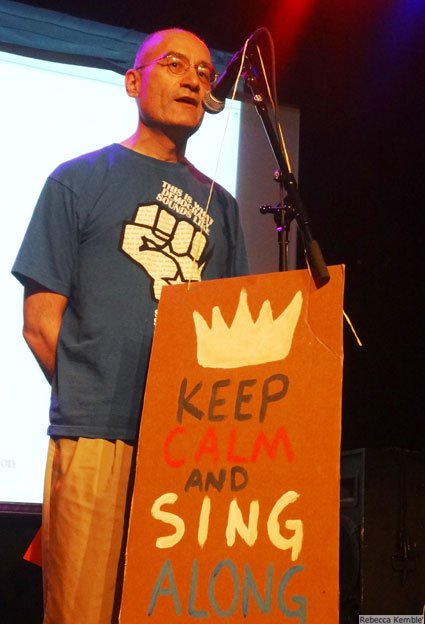The Solidarity Sing Along celebrated its first anniversary on Monday, March 12, 2012 at the High Noon Saloon in Madison, WI. It is the longest continuously running singing protest in history. But despite its impressive longevity, what’s even more remarkable about the Sing Along is the creative expression unleashed amongst participants and their fierce yet peaceful determination to hold public space within the Wisconsin State Capitol open for free speech.
The anniversary party was a rollicking good time that included three sets from the sing along repertoire with musical accompaniment by The Learning Curve, a pick up band of anywhere between four to eighteen musicians. The sets were interspersed with guest appearances by local musicians and the Forward Marching Band, a radical street band that grew out of the 2011 protests against Scott Walker’s assault on the civil and human rights of the people of Wisconsin.
The Overpass Light Brigade also made an appearance with their brand new set of lights. Faculty members Lisa Moline and Lane Hall of the University of Wisconsin – Milwaukee designed large plywood rectangles with led rope lights forming letters on each one to spell out “RECALL WALKER” last winter during the recall signature gathering period. They take groups of volunteers up to highway overpasses to hold the signs. The new set reads “JOHN DOE” to remind motorists that their governor is under a top secret investigation for violations of campaign laws.
It has become cliché to thank Scott Walker for mobilizing people against his extreme rightwing agenda, but when sing along leader Chris Reeder says it you know it’s a genuinely heartfelt sentiment. The friendships and bonds of solidarity forged amongst the loose-knit group of 70 to 200 people who show up to sing five days a week, 54 weeks in a row have been tested and deepened by ongoing verbal abuse and occasional physical attacks by those who would silence them.
The group has refused to comply with what they believe to be unconstitutional permitting and protesting rules set forth by the Department of Administration last December. Under constant threat of arrest, the group continues to assemble in the rotunda at noon without a permit. This has infuriated some Republican lawmakers who have harshly criticized the Capitol Police for shirking their responsibility to uphold and enforce the rules.
The response of sing along participants to every new threat has been an outpouring of even more creativity. New lyrics to songs memorializing trying incidents are written, new banners depicting events and principles are crafted and displayed, and new energy is infused into the group.
On Saturday, March 17, the ACLU of Wisconsin honored the Solidarity Sing Along with the William Gorham Rice Civil Libertarian of the Year Award, the first time it has been given to an entire group of people.
Chris Reeder accepted the award on behalf of the group, and members of the Wisconsin Network of Peace and Justice printed hundreds of certificates and buttons with the award information on them to distribute to sing along members back in Madison.
In his acceptance speech, Reeder thanked the originator of the sing along, Steve Burns, for initiating the group on March 10, the day after the infamous Budget Repair Bill was rammed through the state legislature. He said:
“Steve started us off with a very simple concept: Show up. Sing. Come back the next day and do it again. Repeat until you are heard. Be peaceful, be positive, be polite. But be strong, stand firm, endure. (And, when you can, be melodious.)”
Reeder also commented on the purpose, evolution and importance of the group:
“We have learned so many things over the past year. We’re learning about participatory democracy. We’re learning that our government doesn’t listen unless we talk. We’re learning that voting is not enough. That being informed is not enough. We have to show up. We have to be involved. We have to act.”
As the destructive effects of the laws and the 2011-2013 budget passed by Walker and the Republican-dominated legislature are felt more widely, these same lessons are being learned by people throughout the state. Results of the six upcoming recall elections will be a kind of test of how well these lessons are being learned.
Rebecca Kemble is an Anthropologist who studied decolonization in Kenya. She serves on the Board of the US Federation of Worker Cooperatives and is a founding member of the Wisconsin Citizens Media Cooperative.
